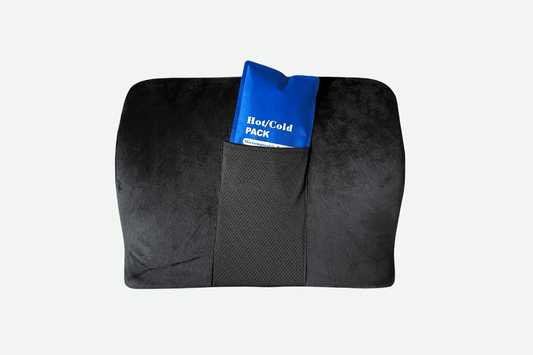Are Hemorrhoids Genetic? Explaining Risk Factors of Hemorrhoids
Robert Cutler, D.O., FAOCPrShare
Hemorrhoids affect a large number of Americans. In fact, half of all Americans over 50 struggle with hemorrhoids, though many under 50 get them regularly too. This frustrating affliction is caused when the many veins in and around the anus are exposed to excess pressure.
Pressure can come from many sources, including constipation, pregnancy, and prolonged sitting. This pressure, however, doesn’t affect everyone the same way. One person may get hemorrhoids from weight lifting while the person next to them doing the same exercise goes hemorrhoid free, and may in fact never experience a flare up in their life.
Why is this? Are hemorrhoids hereditary? Is that partly to blame?
Yes! According to research, hemorrhoids can be related to your genetics. They can be a hand-me-down from your lineage and in this post, we’re going to explain what hemorrhoids look like, when to be concerned, and how to prevent hemorrhoids even if you are genetically predisposed to them.
One thing before we move on: It may surprise you to learn that hemorrhoids are actually a normal part of your anatomy. It is only when they become inflamed that they begin to cause problems. So when we talk about ‘hemorrhoids’ in this post, know that we are talking about symptomatic, inflamed hemorrhoids.
What Causes a Person to Get Hemorrhoids?
Hemorrhoids are most commonly the result of difficult bowel movements. When you strain on the toilet to relieve yourself, pressure is compounded in and around the anus. Soft tissues and veins down there are susceptible to this kind of pressure, which then causes veins to swell and bulge.
Oftentimes, a poor diet with low fiber intake and poor hydration can contribute to constipation, which causes that strain during bowel movements. Prolonged sitting and a lack of physical movement can also create or exacerbate pressure on the anus, which can result in hemorrhoids.
Hemorrhoids can also be caused by medical conditions. The most obvious, of course, is pregnancy, where the changes in the body can cause immense pressure on the anus and surrounding areas. Often, hemorrhoids caused by pregnancy go away on their own after the child is born.
Other medical conditions that can cause or contribute to hemorrhoids are inflammatory bowel diseases (IBD), obesity, ascites (when fluid collects in the abdomen), and anal injuries.
5 Most Common Risk Factors of Hemorrhoids
Difficult bowel movements are the number one culprit when it comes to the main causes of hemorrhoids. This can include both chronic constipation and diarrhea. Both constipation and diarrhea cause a great deal of pressure to be placed on the areas inside and around the anus, causing blood vessels to bulge and become irritated. These issues are often related to poor diet and dehydration.
Lifting heavy items can also put an immense amount of pressure on the lower regions of the body, causing the soft tissues of the veins in the anus to swell. Repeatedly lifting these heavy objects can exacerbate the condition.
Age plays a big role in the increased risk of hemorrhoids, as half of all people over 50 suffer from this affliction. It’s important to take extra preventative measures if you’re between the ages of 50 and 65 years old, so you don’t become prone to hemorrhoids.
Expectant mothers are as at-risk for hemorrhoids as those who are above 50 years old, with over half of all pregnant women suffering from the condition.
Finally, a family history of hemorrhoids may be a common risk factor for this affliction as sometimes it can be related to weaker muscles and overall body types and for many, hemorrhoids is just something that seems to run in families.
Are Some People More Prone to Hemorrhoids than Others?
Can hemorrhoids be hereditary? Heredity is not usually listed as a cause of hemorrhoids, but are hemorrhoids genetic? Lifestyle is often looked to as the culprit, but in recent years, there has been some research that lead scientists to believe there may be a genetic predisposition as well.
The structure of your muscles and other tissues inside of the anus can heavily depend on your genetics and can leave you more prone to inflamed hemorrhoids. Lifestyle choices and medical conditions such as pregnancy can also make you more prone to hemorrhoids than other people, and both the genetic and lifestyle factors combine to make some people particularly susceptible to flare ups.
A sedentary lifestyle, age, and other factors cause people to become vulnerable to this affliction.
Are Hemorrhoids Genetic?
Are hemorrhoids genetic? Yes. A research study published in 2020 found 102 total points on the human genome that indicate risk factors for hemorrhoids. In short, that research means that there is a genetic element to how easily you may develop hemorrhoids.
This doesn’t necessarily mean that people with a genetic predisposition will suffer from hemorrhoids, but it may mean that those people can develop hemorrhoids a lot easier than someone who is not predisposed to the condition.
For example, prevention is more important if you have a family history of hemorrhoids, as your lifestyle choices carry a much heavier weight in determining whether or not you’ll suffer from hemorrhoids and how severe they may become.
It’s always useful to tell your doctor if you have a history of hemorrhoids in your family. Your healthcare provider can help you develop a prevention plan and avoid more severe cases of this condition.
So while it’s true that genes do play a role in causing hemorrhoid flare ups, things like weight and age are much more significant risk factors than your genes when it comes to hemorrhoids. So is your diet, and how easily you’re able to make a bowel movement. So even hemorrhoid-prone people can successfully prevent flare-ups with the right action plan.
In rare cases, hemorrhoids are caused by a genetically inherited disorder called Ehlers-Danlos syndrome (EDS), a condition that sees weaker colorectal muscles and a breaking down of connective tissues in your body, both of which run in the family. Collagen is one of those tissues that are broken down in patients with EDS and a lack of collagen can lead to the impairment of pelvic floor tissues.
What Can Be Done to Prevent Hemorrhoids?
The good news is that no matter if you’re genetically predisposed to hemorrhoid flare-ups or not, it’s pretty easy to prevent most recurrences. While these methods offer no guarantee you won’t experience hemorrhoids, making these lifestyle choices can certainly reduce your risk and the frequency with which you experience intrusive hemorrhoids. Let’s take a look at what can be done.
- Reduce the amount of straining you do on the toilet - this can be achieved by elevating your feet while you’re going to the restroom. By doing so you change the position of rectum, allowing stool to pass with more ease. You may also consider limiting your time in the bathroom. Sitting on the toilet for too long can add to the pressure on your anal area. A good rule to follow is to go as soon as you feel the need and when you’re done, get off the toilet.
- Dietary adjustments may help - when we lack fiber in our diet, we become more prone to constipation, especially as we age. The best diet for hemorrhoids is a high-fiber diet. A high-fiber diet can significantly reduce your risk of experiencing difficult bowel movements, saving yourself a lot of strain during bowel movements. Additionally, stay away from fried foods, cheese, excessive dairy, and processed foods and when you eat meat, choose lean and eat it in moderation.
- Hydration is key - Proper hydration seems to be a preventative measure for just about every condition and there’s a good reason for that. Your body needs water to run properly, just like your car needs oil. When you’re running low, crucial processes can be affected including bowel movements. Proper hydration may help make your bowel movements easier, resulting in less need for strain while relieving yourself.
- Be aware of how long you’re sitting - if you work at a job that requires sitting all day long, make it a point to get up at least once per hour to walk around and get your blood flowing. Sitting for too long can increase the pressure put on your rectal area throughout the day.
- Be cautious of laxatives - if you’re experiencing chronic constipation and are seeking out laxatives for some relief, there are certain types to avoid. Those that stimulate contractions in your lower intestines can actually create more pressure on your rectal region and exacerbate or cause hemorrhoids. Ask your doctor for the right plan to relieve your constipation, instead.
- Set up a doctor's appointment to discuss chronic constipation or diarrhea - if you’re experiencing chronic constipation or diarrhea and you haven’t been able to solve the problem with a clean, healthy diet, it might be time to see your doctor and find out what the cause might be and how to fix it.
- Exercise can reduce your hemorrhoid risk - daily exercise, such as an evening walk through the neighborhood or a morning swim, can do wonders for digestive problems you may be experiencing. In turn, that may relieve or prevent hemorrhoids.
- Take fiber supplements - if you’re struggling to get enough fiber in your diet, take a fiber supplement to ensure you’re getting enough of this crucial nutrient in your daily life. This step alone can cure constipation if it’s caused by your diet, significantly reducing your risk of hemorrhoids.
Next Steps if You Suspect Hemorrhoids are Genetic
When you know that hemorrhoids run in your family, the first thing you should always do is see your doctor. Identifying any other risk factors in your life and correcting them where possible is key. With your doctor, you can create a prevention plan that can help thwart any genetic predisposition to hemorrhoids.
If you’re already suffering from hemorrhoids, the goal is to reduce disruptive symptoms such as itching, burning, swelling, and pain. Treatments may include hemorrhoid cream, which can instantly relieve some hemorrhoid symptoms such as itching, burning, and pain, while also working to reduce swelling. Hemorrhoid cream with lidocaine is a powerful way to relieve the pain your hemorrhoids are causing.
There are a few other options as well. You may also look for a soothing hemorrhoid spray that includes fast-acting ingredients like witch hazel. Witch hazel sprays can also offer instant relief with healing properties. Epsom salt for hemorrhoids will create a soothing bath that quickly works to heal the afflicted area. Seat cushions designed to reduce the pressure on the rectal area as you sit are great for those who find themselves in a seated position for long periods of time.
Shop the full line of hemorrhoid treatment products from Doctor Butler’s to find quick and easy relief from painful and disruptive hemorrhoids.
If you’re treating your hemorrhoids with any of these products and your hemorrhoids are not showing any signs of improvement after a week or two, it’s important to see a doctor as soon as possible.
In some severe cases, surgery may be required to eliminate the inflamed and irritated hemorrhoids and ensure you get back to normal. Your doctor may recommend a hemorrhoidectomy (removing the hemorrhoid altogether) or hemorrhoidal ligation (tying off the blood supply for the afflicted blood vessel).
If you’re still not sure how best to treat your flare up, send a message through our contact page and we can tell you which of our products will help you the most!


